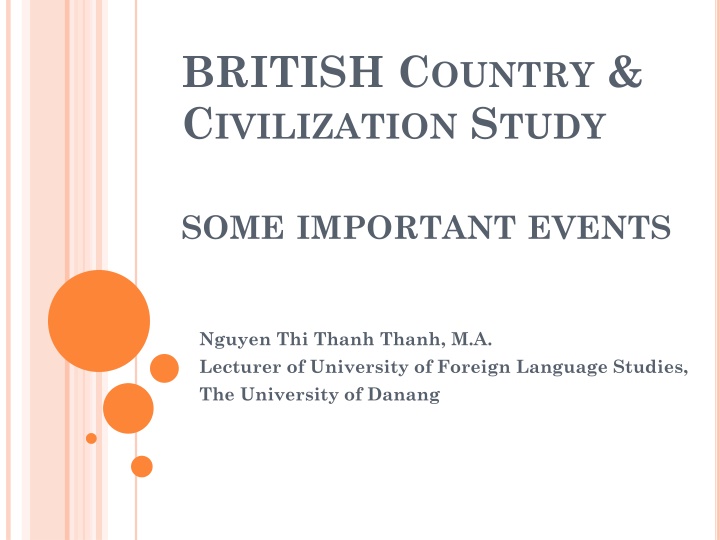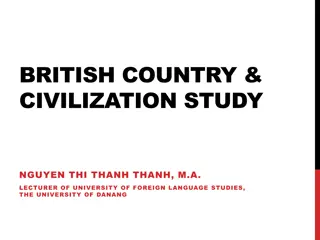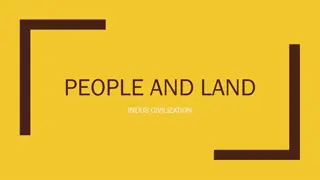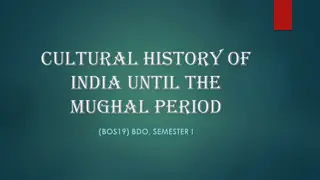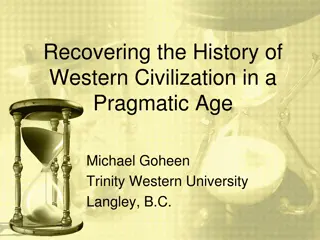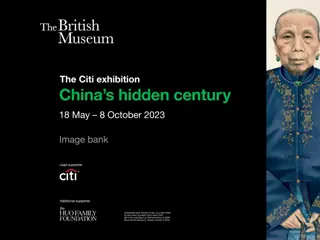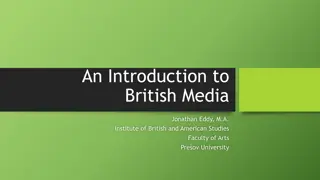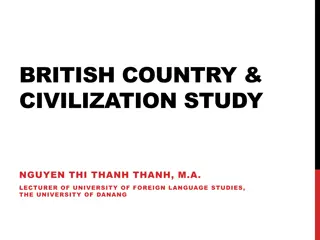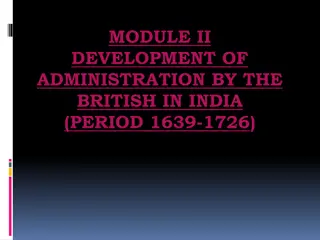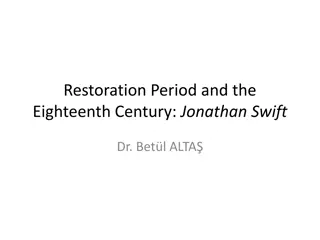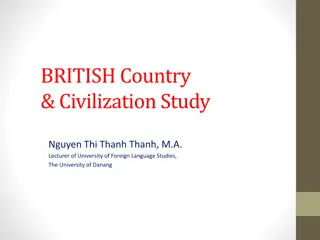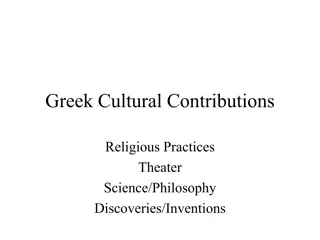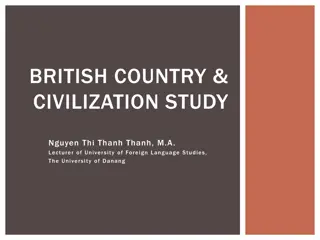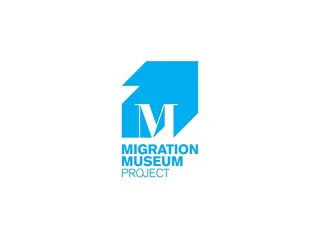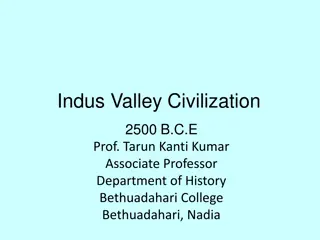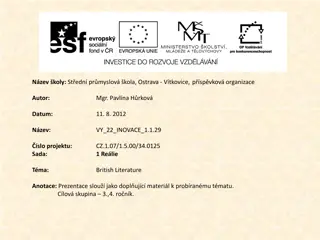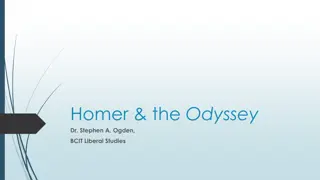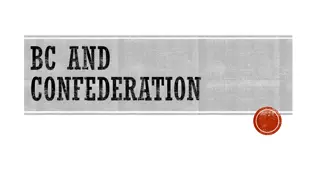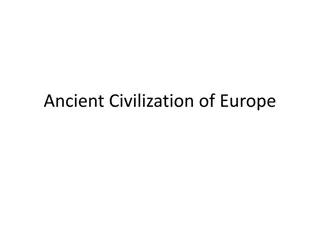British Civilization Study - Important Events in History
Key events in British history from Medieval England to Tudor England, including the Battle of Hastings, Magna Carta, Parliament's origins, the Hundred Years War, and the Tudor dynasty's rise. Learn about the impact of wars, revolts, and political changes on British society.
Download Presentation

Please find below an Image/Link to download the presentation.
The content on the website is provided AS IS for your information and personal use only. It may not be sold, licensed, or shared on other websites without obtaining consent from the author.If you encounter any issues during the download, it is possible that the publisher has removed the file from their server.
You are allowed to download the files provided on this website for personal or commercial use, subject to the condition that they are used lawfully. All files are the property of their respective owners.
The content on the website is provided AS IS for your information and personal use only. It may not be sold, licensed, or shared on other websites without obtaining consent from the author.
E N D
Presentation Transcript
BRITISH COUNTRY & CIVILIZATION STUDY SOME IMPORTANT EVENTS Nguyen Thi Thanh Thanh, M.A. Lecturer of University of Foreign Language Studies, The University of Danang
COURSE SYLLABUS BCSB1 WEEK TITLE UNIT 1: THE UNITED KINGDOM 1 UNIT 2: PEOPLE AND LANGUAGE 2 UNIT 3: SOME IMPORTANT EVENTS IN BRITISH HISTORY Assignment 1 3 -4 UNIT 4: GOVERNMENT 5 UNIT 5: EDUCATION 6 UNIT 6: HOLIDAY Assignment 2 7-8
MEDIEVAL ENGLAND After defeating the Anglo-Saxon king Harold at the Battle of Hastings in 1066, William of Normandy introduced the Norman feudal system, and French remained the language of the upper classes and administration until the 14thcentury. The power of these Norman Barons gradually increased challenge the King s absolute power, which resulted in King John being forced to sign the Magna Carta at Runnymede in 1215. (This document contained a long list of limitations to the King s power)
MEDIEVAL ENGLAND The origins of Parliament are to be found in the reign of John s successor, Henry III. It was a meeting of the King and his Barons and servants at which various administrative and financial problems were discussed.
MEDIEVAL ENGLAND The Hundred Years War (between France and England) a devastating effect on the English economy. This high taxation necessary to finance the war and the Black Death (a plague in 1348 that killed a third of the population of England) led to such extreme hardship for the peasant class a revolt in 1381. led to greatly improved conditions for the peasant class and was the first step towards the ending of the feudal system in England.
TUDOR ENGLAND Hundred Years War over - a long power struggle (1455-85) began for the English Crown between two families: the House of Lancaster and the House of York (The Wars of the Roses) The war ended when Henry VII (Henry of Tudor) united the two rival houses, giving origin to the Tudor dynasty. there was a revival, or Renaissance, of learning, partly as a result of the printing press, which ended the Church s monopoly of learning.
TUDOR ENGLAND Henry s son and heir, Henry VIII (1509-1547), was a typical renaissance Henry head of the Protestant Church of England with the Act of Supremacy in 1534. His decision to act through Parliament greatly strengthen this institution, which had lost virtually all its authority under Henry VII. There was general support on the part of the English people
Elizabeth I (1558-1603) was an outstanding ruler. She restored national unity, routes and brilliant naval commanders (especially Sir Francis Drake and Sir Walter Raleigh) enabled England to dominate these trade routes. During this period great trading companies, like the East India Company, were also established. Parliament was regularly called and consulted, while Justices of the Peace administered justice and carried out all the ordinary functions of local government.
THE CONFLICT BETWEEN KING AND PARLIAMENT The Civil War Convinced of the divine right of kings, the Stuart kings James I and Charles I followed the medieval notion of monarchy, ignoring Parliament. Relations between King and Parliament became so bad that civil war eventually broke out (1642). After Oliver Cromwell had led the Parliamentarian Roundheads to victory (1648), Charles I was executed for treason and Cromwell became Lord Protector. England was now a Republic.
THE RESTORATIONOFTHE MONARCHY The monarchy (together with the Anglican Church and the House of Lords) was restored in 1660, two years after Cromwell s death, when Charles II was invited to sit on the throne of a country tired of the harsh morality of Puritan rule. The Plague killed almost 70,000 of London s inhabitants, and the Great Fire (1666) (signs of God s wrath by the Puritans). The Glorious Revolution (1688) was accompanied by a Bill of Rights, made it obligatory for the sovereign to rule with Parliament s assistance and outlawed Catholicism for all Englishmen, including the King. (from Aspects of Britain and the USA, pp. 21-24)
EMPIRE AND INDUSTRY The Industrial Revolution caused great social changes in Britain. Many people moved from the land to the cities. These people worked in the factories, creating an urban working class In Queen Victoria s reign (1837-1901), children as young as four had jobs in factories and mines. Their parents had no right to vote and try to change things.
EMPIRE AND INDUSTRY The Reform Act (1832) gave the vote to all men who owned a house. But until 1918 that the right to vote was given to all men > 21 and to women > 30. Britain at its most powerful had colonies in every continent, but the end of the Empire came quickly, after the Second World War (1939-1945). India, one of the most important colonies, became independent in 1948. In the 1960s, the African and Caribbean countries also became independent. British people began realise that their country was no longer an imperial world power but just a country in Europe. (from In Britain-21st Century Edition, p.13)
DID YOU KNOW? Magna Carta a document that King John was forced to sign by the English barons at Runnymede in 1215. It restricted the king's power and gave new rights to the barons and the people. Some of these rights are basic to modern British law, e.g. the right to have a trial before being put in prison. John (1167-1216) the king of England from 1199 to 1216. He was the youngest son of Henry II and became king after the death of his brother Richard I, having previously tried to take power from him. and was forced by his barons in 1215 to sign the Magna Carta, which limited his royal powers.
DID YOU KNOW? the Model Parliament the name later given to the English parliament set up in 1295 by King Edward I. It was the first to include not only members of the clergy and the aristocracy but also elected members to represent ordinary people. It established the pattern for future parliaments. The Hundred Years War a war between France and England that lasted, with long periods between battles, from the 1340s to the 1450s. The English were trying to get control of France.
DID YOU KNOW? the Golden Age Elizabeth I's rule is remembered as the Golden Age of English history. Under her rule, England advanced in such areas as foreign trade, exploration, literature, and the arts. During Elizabeth's reign the age of exploration began with explorers such as Francis Drake claiming new lands for England and introducing new materials and foods. The American State, Virginia, is named after her.
DID YOU KNOW? the Civil War a war (1642-51) between the King of England, Charles I, and his parliament. Its causes were both political and religious. It divided the people of England and caused great suffering. Charles I's soldiers (the Cavaliers) were defeated by those of parliament (the Roundheads) at the battles of Marston Moor (1644) and Naseby (1645). Charles I was held prisoner and was then executed. The Commonwealth was declared. For 11 years England had no king or queen, although for much of this time it had a strong leader in Oliver Cromwell. The Commonwealth did not last long after Cromwell's death, however, and in 1660 Charles's son took his place as King Charles II at the Restoration.
DID YOU KNOW? the Glorious Revolution (the Bloodless Revolution) the events in Britain in 1688 when the Roman Catholic James II was removed as king and replaced by his daughter Mary and her husband William III (William of Orange). So many of James's Protestant officers joined William's side that there was no fighting, and James escaped to France with his family. These events are also called the Glorious Revolution because constitutional monarchy was introduced at the same time.
DID YOU KNOW? the Bill of Rights the informal name of the Act Declaring the Rights and Liberties of the Subject, which was passed by Parliament in 1689. This Act dealt with the relationship between the king or queen and Parliament, not with the rights of individuals. The earlier Declaration of Right had greatly reduced the power of the king or queen, and the new Act helped make Britain a constitutional monarchy, in which real power lies with Parliament, not with the monarch. The Act also prevented a Roman Catholic from becoming king or queen.
DID YOU KNOW? the Industrial Revolution the phrase used to describe Britain's progress in the 18th and 19th century from being largely an agricultural country to being an industrial one. Britain was the first country to change in this way. During this time, many important machines were invented. These were mostly made possible by the discovery of steam power and the invention of the steam engine. Big factories were built which could produce a wide variety of goods in large quantities. New methods of transport, (canals and railways) During the Industrial Revolution, the populations of cities grew rapidly The same kind of development soon began in other countries in Europe and in the US. (from Oxford Guide to British and American Culture)
SUMMARY: BRITISH IMPORTANT EVENTS Medieval England Tudor England The conflict between the King and Parliament The Restoration of the Mornarchy Empire and Industry Important events NEXT LESSON: Government
THANK YOU FOR YOUR LISTENING
